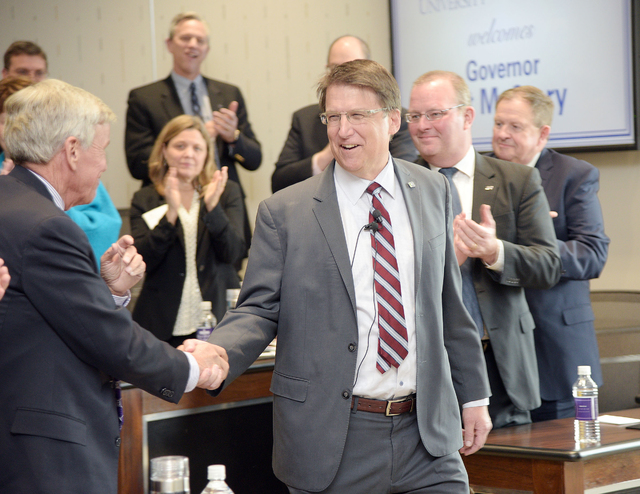RALEIGH, N.C. (AP) — More than 100 corporate executives added their names to a letter delivered to North Carolina’s governor on Thursday calling for the repeal of the nation’s first state law limiting bathroom options for transgender people. ADVERTISING RALEIGH,
RALEIGH, N.C. (AP) — More than 100 corporate executives added their names to a letter delivered to North Carolina’s governor on Thursday calling for the repeal of the nation’s first state law limiting bathroom options for transgender people.
The law signed by Republican Gov. Pat McCrory also prohibits local anti-discrimination measures, prevents workers from suing in state court alleging discrimination on the basis of race, sex and other factors; and prevents cities and counties from requiring businesses to provide minimum wages or paid sick leave.
Human Rights Campaign and Equality North Carolina announced the growing list of corporate leaders after delivering the letter and meeting privately with McCrory. They declined to discuss his response.
The list now includes leaders of many sectors of the economy.
Tourism is represented by Hilton, Marriott and Starwood hotels; AirBnB, Uber and Lyft; and American Airlines, which has a major hub in Charlotte, the state’s largest city. Banking and finance executives include the leaders of Bank of America, Citibank, TD Bank, PayPal, and others; Restaurateurs and retailers include leaders of Starbucks, Barnes &Noble and Levi Strauss; and Technology leaders joined in force, including the leaders of IBM, Apple, Intel, Google, Facebook, Yahoo, eBay, Twitter, YouTube, and many others.
The new law “will make it far more challenging for businesses across the state to recruit and retain the nation’s best and brightest workers and attract the most talented students from across the nation.
It will also
diminish the state’s draw as a destination for tourism, new businesses, and economic activity,” the letter said.
“They know this attack on lesbian, gay, bisexual and especially transgender North Carolinians isn’t just morally wrong — it also puts their employees, customers and North Carolina’s economy at risk,” HRC President Chad Griffin said in a statement.
The advocates noted that McCrory said Monday that the law “doesn’t take away any rights that currently existed in any city in North Carolina.”
The law was passed introduced, debated, and signed last week after a 12-hour special session called to keep Charlotte’s ordinance from taking effect on April 1. That ordinance would have provided protections against discrimination on the basis of sexual orientation and gender identity.
But the law also forces transgender students to use restrooms that don’t match their gender identity, a situation that denies their right to equal treatment, according to the federal government. Similar proposals have been considered in other states’ legislatures and even approved this year in South Dakota, whose government vetoed it after meeting with transgender students.



